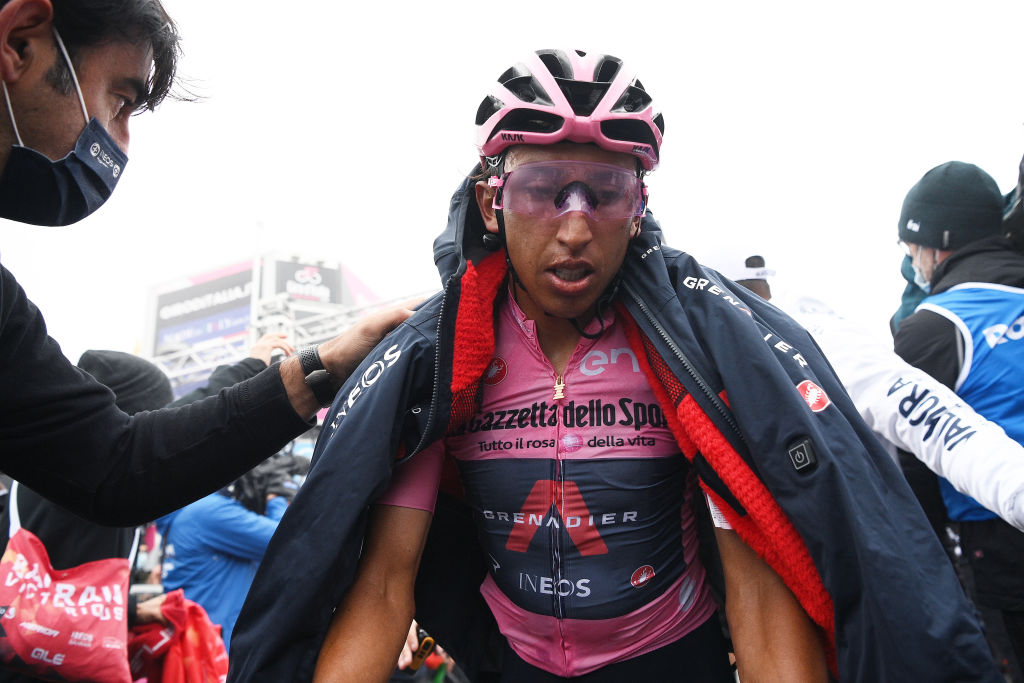Giro d'Italia leader Bernal underlines mountain strength with late attack on Zoncolan
Colombian says back is no issue as he almost doubles GC lead

Egan Bernal (Ineos Grenadiers) has taken another major step towards winning his first Giro d'Italia as the Colombian racer all but doubled his overall lead with a late attack on the fearsome Monte Zoncolan on stage 14.
The leader since stage 9, where he soloed to victory on the difficult but short gravel ascent to the summit finish of Campo Felice, Bernal has been the most consistent and strongest of the favourites on all the Giro climbs to date.
But the question mark over how he would race on the biggest mountain stages of all in the Giro's second and third weeks remained unanswered – until today.
On the Zoncolan, the Giro's hardest single summit finish this year, Bernal more than settled that issue as rival after rival dropped back and he easily tracked Simon Yates (Team BikeExchange) when the Briton broke away with two kilometres to go, then dropped him with 500 metres to go.
Fourth on the stage behind the early breakaways, Bernal has now strengthened his overall lead from 45 seconds on Aleksandr Vlasov (Astana-Premier Tech), previously second but sliding to fourth overall, to 1:33 on Yates, now his closest pursuer on GC.
Asked if he had done better or worse than he had anticipated, Bernal said: "I'm happy because finally I've taken time on my closest rivals. Vlasov was at less than a minute, now Yates is second but he's further back as well."
Added to that, he said, "I've continued in pink and it didn't rain and wasn't freezing cold, finally, so that was another good thing." He also highlighted that his back injury, which did his 2020 season so much damage, is still not troubling him, which gives him even greater room for optimism.
Get The Leadout Newsletter
The latest race content, interviews, features, reviews and expert buying guides, direct to your inbox!
While Yates was able to limit the damage to a comparatively scant 11 seconds, others were not so fortunate.
Remco Evenepoel (Deceuninck-QuickStep) was the first to lose contact with two kilometres to go, losing 90 seconds at the finish, then when Yates attacked and Bernal followed, all the other GC contenders found themselves struggling.
Asked if he considered Yates to be his biggest rival, Bernal said "all of them are dangerous. First people said it was Remco, then it was Vlasov I had to worry about, now it's Yates. Basically, I have to be sure to watch them all."
While Bernal finished off the job brilliantly, his teammates were more than up to the task of shredding the field for much of the Zoncolan. Gianni Moscon and Jhonatan Narváez handled the lower slopes, then Jonathan Castroviejo and finally Dani Martínez proved to be more than up to the task when the road ramped up in the last three kilometres.
However, when Yates attacked, it was up to Bernal to chase him down and he proved more than up to the task.
"He's got lots of experience and I have a lot of respect for him;" Bernal said, "but he was the rival I was most expecting would attack. The Zoncolan is a climb that suited him well."
"I think I've done well, it was a very fast stage, for much of the climb I was following wheels, thanks to my teammates who did a brilliant job. Yates is strong, but I'm pleased I could go with him today when he attacked."
As for what he made of the Zoncolan himself, Bernal argued that it had been as tough as he expected, and even using a 36x32 gearing, it had been a major challenge. "I've never known another climb like it," he said, "that last part, in particular, was really hard."
However, the Zoncolan is now behind him, and if Bernal was the rider to beat beforehand, the 2021 Giro is now his to lose. The last week of the Giro is unquestionably the hardest of the entire event. But Bernal has proved to be in a class of his own up to now on the climbs and the Zoncolan, the toughest ascent of the entire Giro, did little more than underline that fact.
Alasdair Fotheringham has been reporting on cycling since 1991. He has covered every Tour de France since 1992 bar one, as well as numerous other bike races of all shapes and sizes, ranging from the Olympic Games in 2008 to the now sadly defunct Subida a Urkiola hill climb in Spain. As well as working for Cyclingnews, he has also written for The Independent, The Guardian, ProCycling, The Express and Reuters.
